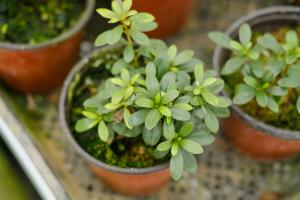When Should I Plant: Tips for a Successful Garden
Planting a garden can be an incredibly rewarding experience, but it requires careful planning and consideration. One of the most important decisions you'll make is choosing the right time to plant. Here are some tips on when to plant your garden for optimal results.
Early Spring
If you're anxious to get started, early spring is a great time to plant some hardy crops. Vegetables like peas, spinach, and lettuce can be planted as soon as the soil can be worked. This typically occurs when the ground has thawed and dried out enough that it's no longer muddy or waterlogged. You can also start planting certain flower seeds in early spring, like pansies, violas, and snapdragons.
Late Spring
For most gardeners, late spring is the ideal time to start planting most crops. By this point, the soil has had a chance to warm up, and any lingering frost danger has passed. The exact planting dates will depend on your climate, so be sure to check with a local extension service or gardening center for specific advice. Some popular crops to plant in late spring include tomatoes, peppers, cucumbers, and beans.
Early Summer
If you miss the late spring window, don't worry鈥攖here's still time to plant in early summer. Some vegetables, like squash and corn, can be planted later in the season and still produce a good yield. However, be aware that the hotter temperatures can make it more challenging to keep the plants hydrated, so you'll need to be diligent about watering and mulching.
Fall
While most gardeners associate planting with the spring and summer months, fall can be an excellent time to plant certain crops as well. In fact, planting vegetables and flowers in the fall can often yield better results than planting in the summer. This is because the cooler temperatures and higher moisture levels can promote strong root growth without stressing the plants. Some fall planting options include kale, broccoli, cauliflower, and chrysanthemums.
Factors to Consider
In addition to the time of year, there are a number of other factors you'll want to consider when deciding when to plant your garden. These include:
- Soil temperature: Different crops have different temperature requirements for germination and growth. Be sure to check the ideal soil temperature for each plant before planting.
- Frost danger: Some crops are more susceptible to frost damage than others. Be sure to know your last and first frost dates to avoid planting too early or too late.
- Planting schedule: Depending on the crops you're planting, you may want to stagger your planting schedule to ensure a steady harvest throughout the season.
- Planting method: Some crops, like tomatoes and peppers, benefit from being started indoors and transplanted outside after the danger of frost has passed. Be sure to plan ahead for these kinds of crops.
Conclusion
Choosing the right time to plant your garden is a critical step in ensuring a successful harvest. By considering factors like temperature, frost danger, and your planting schedule, you can make informed decisions and set your garden up for success. Whether you're a beginner or a seasoned gardener, taking the time to plan your planting schedule is well worth the effort. Good luck, and happy gardening!

 how many times do yo...
how many times do yo... how many planted tre...
how many planted tre... how many pine trees ...
how many pine trees ... how many pecan trees...
how many pecan trees... how many plants comp...
how many plants comp... how many plants can ...
how many plants can ... how many plants and ...
how many plants and ... how many pepper plan...
how many pepper plan...































